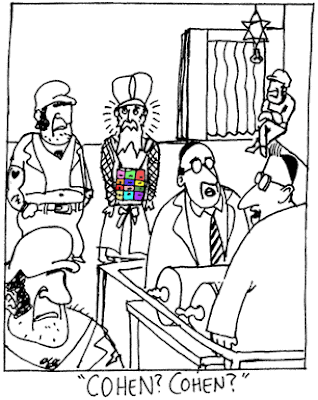 |
| Picture: Rabbi Mordechai Becher |
"And Aaron shall carry the names of the Children of Israel in the Breastplate of Judgment over his heart, when he enters the Holy Place, as a rememberance before G·d at all times. And you shall place the Urim and the Tumin (a parchment containing G-d's name) into the (fold of the) Breastplate of Judgment so that it will be over Aaron's heart when he comes before G·d . . "
[Tetzaveh 28:29-30]
The Breastplate of Judgment was a prophetic device, worn by the High Priest, through which questions could be asked of G·d. When the king or the High Court (Sanhedrin) would ask a question, the Priest would see various letters sparkle or bulge out. Using Divine Inspiration, he would then be able to combine the letters to spell out the answer. [See Aryeh Kaplan, Handbook of Jewish Thought, vol. 1 (New York: Moznaim, 1979), 6:36 and fn. 110, for more on this subject]
There were twelve precious stones set in the Breastplate of Judgment. They were engraved with the names of the Patriarchs, Abraham, Isaac and Jacob, the names of the twelve tribes, and the words "tribes of Yeshurun." Certain letters, such as the gimel or the zayin, were written only once. [Yoma 73b]
As our Sages have said, the Breastplate barely contained all twenty-two letters of the Hebrew alphabet. Therefore, when they had to ask a question that used several of the same letters, such as "Should I go to Bavel," how were they answered?
The question "Should I go to Bavel?" contains two letters beit, and three lameds. However, it is likely that the author was only using this as an example of a phrase with repeating letters, because there were at least five beits and four lameds in the Breastplate - enough to spell out these words.
There is a very great mystery in this . . . I heard from my grandfather [the Baal Shem Tov], that each of the twenty-two letters [of the Hebrew alphabet] contains within it all the other letters of the alphabet - these can be attained by spelling out each letter in full. For instance, writing out the letter aleph in full provides a lamed and a phey. Furthermore, each of these letters can be further expanded, to produce even more letters, until the entire Hebrew alphabet is reconstituted - except for the letter mem which, when written in full, will not produce any additional letters.
Since G·d commanded that all twenty-two letters be inscribed on the Breastplate, when the priest would be enwrapped in Divine inspiration, the letters would shine in their expanded forms. This enabled the priest to receive everything he needed to know. This is the meaning of "shoham stones and filling stones "avnei miluyim" for the apron and for the Breastplate" [Tetzaveh 25:7].
"Avnei miluyim" read alternatively as "stones that are filled out" - meaning that the engraved letters shone in their expanded forms. In a number of other lessons on this theme, the Baal Shem Tov explains that additional letters can be derived from a single letter by using the techniques of gematria (numerical value of the letters), or by dividing the letters into their component parts. It is possible that those approaches were originally mentioned with this lesson, since there are a number of other letters, such as the gimel, zayin, ches, tes and samech that could never be derived from the other letters, no matter how many times they are spelled out.
Source: From the writings of the Baal Shem Tov
Translation and Commentary by Rabbi Dr. Eliezer Shore






















